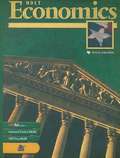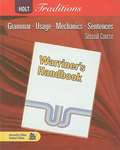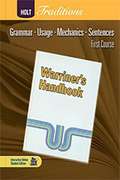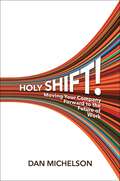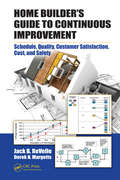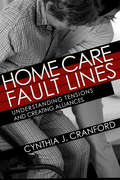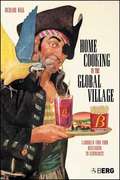- Table View
- List View
Holt Economics
by Robert L. PenningtonHelping you develop critical thinking skills is an important tool of Holt Economics. Throughout Holt Economics, you are asked to think critically about the events and processes that shape your global, national and local economy. Critical thinking is the reasoned judgment of information and ideas.
Holt Economics (Texas Edition)
by Robert L. PenningtonThroughout Holt Economics, you are asked to think critically about the events and processes that shape your global, nation, and local economy. Critical thinking is the reasoned judgment of information and ideas.
Holt Lunsford Commercial
by Arthur I Segel John H. Vogel Jr.Holt Lunsford is debating how to grow his Dallas-based commercial real estate services firm and how to advise a long-time client who is wondering whether to lease or buy an industrial warehouse. Focuses on the highly competitive and increasingly institutionalized $50 billion real estate services industry, which encompasses property management, leasing, tenant representation, and other activities. What makes Lunsford's firm, The Holt Companies, special? Explores what corporate strategy Lunsford should choose for his firm, and what recommendation he should make to his client.
Holt Traditions, Warriner's Handbook: First Course
by John E. WarrinerThis book can be used as a complete grammar, usage, and mechanics textbook, and also as a reference guide when you work on any piece of writing. Whether you are writing a personal letter, a report for your social studies class, or some other piece of writing, you can use the Holt Handbook to answer your questions about grammar, usage, capitalization, punctuation, and spelling.
Holy Shift!: Moving Your Company Forward to the Future of Work
by Dan MichelsonHOLY SHIFT! Moving Your Company Forward to the Future of Work takes you on a fascinating journey to the heart of the single biggest and fastest shift in how we work and live in history. Readers and leaders at every level of an organization will discover stunningly practical ideas and actions that address the three big and thorny questions of our time: How did we get here, where do we go from here, and how do we get there?A visionary CEO with a track-record of building world-class company cultures, Dan Michelson combines a reflection of how we got to now with research on how companies are managing this moment to create a roadmap in the form of a strategic framework and pragmatic playbook. HOLY SHIFT! maps the three simple steps that you can take to create momentum to move your company forward to the future of work: STEP ONE: See the Shift – Understanding how we got to now helps us to determine where we should go from here. We&’re living through a truly stunning and historical change. In other words, shift has happened. STEP TWO: Shift Your Mindset – A shift in thinking is now needed to help you turn culture into a strategy for your company. It&’s time to pivot to an approach that truly brings people together. STEP THREE: Make Shift Happen – Here&’s your strategic framework and playbook to help people on your team feel like they are part of the CORE and connected to your company, culture, and their co-workers. This is truly a once-in-a-lifetime opportunity for leaders to lead. It&’s time to move forward. Welcome to HOLY SHIFT!
Home Builder's Guide to Continuous Improvement: Schedule, Quality, Customer Satisfaction, Cost, and Safety
by Jack B. ReVelle Derek N. MargettsPresenting well-known tools and techniques, the Home Builder's Guide to Continuous Improvement provides important insights and necessary information to reduce cycle time duration and variation in order to improve quality and customer satisfaction and to minimize costs and accidents. Each chapter offers examples based on the authors' personal experi
Home Business Tax Deductions
by Stephen FishmanKeep your hard-earned money in your home business! Completely updated for 2012 returns! Tax deductions are essential to any business, but even more so when your office is also your home. Don't spend thousands on an accountant -- turn to Home Business Tax Deductions and do it yourself! Organized into categories of commonly-used deductions, Home Business Tax Deductions will help you write off: - your home office - start-up and operating expenses - vehicles,meals, entertainment, and travel - health insurance and medical bills - inventory - equipment This edition of Home Business Tax Deductions is completely updated with all the latest tax information, eligibility requirements, and deductions for 2012 returns, including up-to-date information on how the latest laws could affect your home business.
Home Business Tax Deductions: Keep What You Earn
by Stephen FishmanPay less to the IRS Completely updated for 2016 returns! For any home business, claiming all the tax deductions you are entitled to is essential to your business financial success. Don't miss out on the many valuable deductions you can claim. Here, you'll find out how to deduct: start-up costs home office expenses (using new IRS rules) vehicles and travel expenses entertainment and meals medical expenses under Obamacare, and retirement expenses. You'll also learn how to keep accurate, thorough records in case the IRS ever comes calling. Easy to read and full of real-life examples, this book can help you take advantage of all the valuable deductions you are entitled to. Includes the top home business deductions--the most valuable ones and how to claim them.
Home Business Tax Deductions: Keep What You Earn
by Stephen FishmanPay less to the IRS Completely updated for 2017 returns! For any home business, claiming all the tax deductions you are entitled to is essential to your business financial success. Don't miss out on the many valuable deductions you can claim. Here, you'll find out how to deduct: start-up costs home office expenses (using new IRS rules) vehicles and travel expenses entertainment and meals medical expenses under Obamacare, and retirement expenses. You'll also learn how to keep accurate, thorough records in case the IRS ever comes calling. Easy to read and full of real-life examples, this book can help you take advantage of all the valuable deductions you are entitled to. Includes the top most valuable home business deductions and how to claim them.
Home Business Tax Deductions: Keep What You Earn
by Stephen FishmanUnderstanding tax deductions is an essential part of any home business—without the money saved by taking deductions, many home businesses couldn’t get started or operate profitably. Home Business Tax Deductions covers all you need to know about the new tax laws to make sure you that you are taking advantage of all the tax deductions to which you are entitled. Practical and organized by chapter into the most commonly used home business tax deductions, this book shows how to plan for and take advantage of the tax breaks available to home business owners. From home office expenses to start-up expenses to health care costs to travel, and meals, this book shows home business owners how to deduct their business-related expenses and pay less to the IRS.
Home Business Tax Deductions: Keep What You Earn
by Stephen FishmanAll you need to know about the Tax Cuts and Jobs Act to make sure you are taking advantage of all the deductions you are entitled to. For any home business, claiming all the tax deductions you are entitled to is essential to your business’s financial success. Don’t miss out on the many valuable deductions you can claim. Here, you’ll find out how to deduct: start-up costs home office expenses vehicles, meals, and travel expenses medical expenses under Obamacare, and retirement expenses. You’ll also learn how to keep accurate, thorough records in case the IRS ever comes calling. Easy to read and full of real-life examples, this book can help you take advantage of all the valuable deductions you are entitled to. This edition is completely updated to cover the new Tax Cuts and Jobs Act.
Home Business Tax Deductions: Keep What You Earn (5th edition)
by Stephen FishmanFishman, the author of Deduct It! Lower Your Small Business Taxes and other works, explains how owners of home-based businesses can take advantage of tax deductions such as office costs, health insurance, entertainment and meals, and startup and operating expenses. The revised second edition is updated with the most recent tax information and numbers. Annotation ©2006 Book News, Inc., Portland, OR (booknews.com)
Home Buying 101: From Mortgages and the MLS to Making the Offer and Moving In, Your Essential Guide to Buying Your First Home (Adams 101 Series)
by Jon GoreyLearn all the ins and outs of buying a home and give yourself an advantage in the real estate game with this essential house-buying guidebook.Buying a first home can be both exciting and nerve-wracking. Will you qualify for a mortgage? Is your dream home achievable? How do you make sure your offer will beat others? Don&’t worry—now you can arm yourself with the information you need to know before you begin the hunt! In Home Buying 101, you will learn all the skills you need to find the right house at the right price, with financing that fits your budget. Full of nuts-and-bolts advice and organized in an easy-to-read format, this book will teach you all the basics of: -Deciding the right time to buy -Getting your finances in order -Choosing a realtor—or going solo -Assessing neighborhood/comps -Deciphering the MLS/reading the listings for clues -Buyers&’ vs. sellers&’ markets -Types of mortgage loans -Property insurance -Making a smart offer With the help of this guide, you&’ll learn how to find the house of your dreams at a price you can afford!
Home Buying Kit For Dummies
by Eric Tyson Ray BrownAmerica's #1 bestselling home buying guide Are you looking to buy a house, but don't quite know where to begin? Have no fear! This new edition of Home Buying Kit For Dummies arms you with Eric Tyson and Ray Brown's time-tested advice and strategies for buying a home in current market conditions. Packed with valuable tips for getting the best deal on your new home and navigating an ever-changing housing market, it shows you how to find the right property, make smart financial decisions, and understand the latest lending requirements and tax implications. Thanks to looser lending standards, lower down payment mortgages, and a wider selection of homes to choose from, first-time homebuyers are making a comeback in the housing market. But if you don't know a Colonial from a counter offer, the process of buying a home can be daunting. Luckily, this bestselling guide is here to take the confusion out of the process! In plain English, it provides step-by-step guidance for buying the home of your dreams, from inspecting a property to evaluating a location to making sense of loan applications, tax documents, and counter offer forms. Negotiate your best deal and obtain a lower down payment mortgage Improve your credit score Make sense of changing lending standards Take the confusion out of lending laws, mortgage rates, and marketplace conditions Whether you're a renter, investor, or current homeowner, everything you need to plant roots in a new home sweet home is just a page away.
Home Buying Kit For Dummies
by Eric Tyson Ray BrownNegotiate a great price Find your best mortgage Discover applications and checklists online Get the Best Deal on Your New Home! When it comes to buying a home, it's hard to know where to begin. You want to buy at a fair price at the right time—not always easy in a fast-changing market. The updated Home Buying Kit has all you need: strategies to secure the optimal deal, the ins and outs of home financing, how to evaluate rent vs. buy, and the latest on regulations around mortgage interest and property tax. Whether a first-time buyer or veteran homeowner, this book will help you make the smart decisions that move you into your dream home in no time! Inside... Get your finances in order Improve your credit score Choose the right mortgage Build your real estate team Maximize your financial health Inspect and protect your home Understand and minimize closing costs
Home Buying Kit For Dummies
by Eric Tyson Ray Brown Robert S. GriswoldThe top choice among home buyers in need of assistance Home Buying Kit For Dummies is your one-stop guide to navigating the housing market and buying a home. This updated book helps you through the largest—and most complex—purchase you're likely to make, offering a map to navigating the occasionally choppy waters of home buying. Get insight on evaluating your financial readiness to buy a house, securing a mortgage, building a team of advisors, negotiating a deal, and getting your new home ready after you buy. A small investment in know-how will make a big difference, making every step of the home buying process smoother. Understand interest rates and determine your budget for buying a new home Learn how to get approved for a mortgage and recognize fair house prices Get a real estate agent and find the home that fits your needs Survive the inspection and appraisal stage, then seal the deal This book is a perfect choice for first-time and inexperienced home buyers who need advice on the steps in buying a home.
Home Buying Kit For Dummies, 5th Edition
by Eric Tyson Ray BrownAmerica's #1 bestselling home buying guide Want to buy a house, but concerned about the real estate market? Have no fear--Home Buying Kit For Dummies arms you with Eric Tyson and Ray Brown's time-tested advice and updated strategies for buying a home in current market conditions. You'll discover how to find theright property, make smart financial decisions, and understand the latest lending requirements and tax implications. You'll discover how to take advantage of low home prices, navigate tighter lending requirements, and take advantage of the newest resources available to home buyers and new owners. Plus, the bonus CD-ROM is chock-full of information, materials, and resources for first-time buyers and savvy investors alike. All the forms and paperwork needed for buying a home, including: loan applications, appropriate tax documents, counter offer forms, and more Worksheets and calculators for comparable market analysis, budget, mortgage, property taxes, and more Printable home buying checklists for hiring an agent, home inspections, and questions to ask during home visits Home Buying Kit For Dummies is for the millions of home-buyers throughout the U. S. who need a fun and easy guide to navigating the complexities of purchasing and owning a home.
Home Buying for Dummies (2nd edition)
by Ray B. Browne Eric TysonEasy-to-follow information on buying a home.
Home Care Fault Lines: Understanding Tensions and Creating Alliances (The Culture and Politics of Health Care Work)
by Cynthia J. CranfordIn this revealing look at home care, Cynthia J. Cranford illustrates how elderly and disabled people and the immigrant women workers who assist them in daily activities develop meaningful relationships even when their different ages, abilities, races, nationalities, and socioeconomic backgrounds generate tension. As Cranford shows, workers can experience devaluation within racialized and gendered class hierarchies, which shapes their pursuit of security. Cranford analyzes the tensions, alliances, and compromises between security for workers and flexibility for elderly and disabled people, and she argues that workers and recipients negotiate flexibility and security within intersecting inequalities in varying ways depending on multiple interacting dynamics. What comes through from Cranford's analysis is the need for deeply democratic alliances across multiple axes of inequality. To support both flexible care and secure work, she argues for an intimate community unionism that advocates for universal state funding, designs culturally sensitive labor market intermediaries run by workers and recipients to help people find jobs or workers, and addresses everyday tensions in home workplaces.
Home Cooking in the Global Village: Caribbean Food from Buccaneers to Ecotourists (Anthropology and Material Culture)
by Richard WilkWinner of the Society for Economic Anthropology Annual Book Prize 2008. Belize, a tiny corner of the Caribbean wedged into Central America, has been a fast food nation since buccaneers and pirates first stole ashore. As early as the 1600s it was already caught in the great paradox of globalization: how can you stay local and relish your own home cooking, while tasting the delights of the global marketplace? Menus, recipes and bad colonial poetry combine with Wilk's sharp anthropological insight to give an important new perspective on the perils and problems of globalization.
Home Depot and Interconnected Retail
by Ryan Johnson Jose B. Alvarez Zeynep TonIn November 2011, just days before the holiday shopping rush, the senior leadership team of The Home Depot, Inc., (Home Depot), the world's largest home improvement chain, discussed how best to navigate the new interconnected world of retail. Retailers across the board faced a rapidly changing environment with the growing acceptance of on-line retailing that empowered customers by providing greater price transparency and more options. Marketing channels and communication touch points continued to shift. Home Depot's leadership grappled with the challenges of operating in an interconnected world, how best to leverage Home Depot's brick-and-mortar success in the new environment, and continuing to build and sustain lasting emotional connections with customers.
Home Depot, Inc.
by Krishna G. PalepuHome Depot, founded in 1978, pioneered the warehouse retailing concept in the home center industry. The company's niche strategy resulted in rapid growth in sales. By 1986, however, the company began experiencing deteriorating profitability. Students are asked to analyze the company's performance using ratio analysis and sustainable growth framework, and to recommend a plan of action.
Home Depot, Inc., in the New Millennium
by Krishna G. Palepu Jeremy CottAfter nearly two decades of spectacular performance, Home Depot reported a disappointing performance in the year 2000. The company began expanding its business scope as a result of saturating its growth in the core business. This case explores whether the disappointing performance is just a temporary slip or if the company is reaching the limits of sustainability of its competitive advantage.

